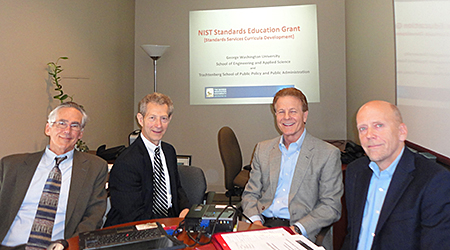Our new Environmental and Energy Management Institute received a $75,000 grant from the National Institute of Standards and Technology in September 2014. This project, entitled the GW Standards Education Initiative, is a collaborative effort between SEAS and the George Washington Institute of Public Policy (GWIPP).
The project has three objectives. The first objective is to develop a graduate-level foundational course on a) the role of standards and conformity assessment in promoting safety, interoperability, sustainability and prosperity in the modern world, and b) the structures and processes for creating and using documentary consensus standards. The course will be designed to serve as the common first course in several course sequences in which the subsequent courses are more specialized ones taught in other GW schools.
The second objective is to establish a four-course certificate program in the GW School of Engineering and Applied Science (SEAS). Entitled the Environmental and Energy Management Graduate Certificate Program, it would qualify graduates for technical and managerial positions in industry and government organizations where the management of environmental and energy issues is structured around national or international system standards (e.g., ISO 14000 and ISO 50001).
The third objective is to persuade and assist professors in other GW schools – business, law, public policy, public health, etc. – to plan similar course sequences in their schools, sequences that build on the same foundational course. In some cases, the foundational course will be a prerequisite for the more specialized one(s), as in the planned SEAS certificate program; in others it would be recommended but voluntary. Our vision is the integration of standards education into courses and programs across the university through a network that shares a common hub.
The four courses in the Certificate Program are described below:
Course 1: Standards, Standardization and Conformity Assessment - National and International (PPPA XXXX): This new, foundational course will cover national and international consensus standards, the structure and operations of national and international standards development organizations, the process of standardization, the function and practice of conformity assessment, and the role of standards in society for promoting public policy, safety, interoperability, sustainability and prosperity. The International Standards Organization (ISO) and the American National Standards Institute (ANSI) have agreed to support the development and conduct of this course by assisting with curricular materials (e.g., case studies), and providing guest lecturers. (Grant would fund course development.)
Course 2: Beyond Compliance - Next Generation Environmental Self-Governance (EMSE 6992): The goal of this course is to develop and enhance the knowledge and capabilities of students about next generation environmental and energy management systems that are based on self-governance approaches that go beyond compliance requirements. The course exemplifies these systems by specifically focusing on the implementation of environmental and energy systems that conform to international standards ISO 14000, Environmental Management Systems, and ISO 50001, Energy Management Systems. (Course partially developed; grant would fund completion.)
Course 3: Environmental Management (EMSE 6220): Covers technical, economic, political, administrative, and social forces influencing the quality of the environment and the use of resources. This course also addresses government and industrial programs to combat pollution of the air, soil, and water; existing and pending pertinent legislation; and theoretical aspects of specific management problems. (Course has been developed and has been offered successfully.)
Course 4: Energy Management (EMSE 6260): Covers the examination of the range of available energy resources, trends in their use, the programs and organizations that have developed and evolved to address problems associated with energy resource use. (Course has been developed and has been offered successfully.)
The team leading the effort consists of Professor Joseph Cascio (EEM Visiting Scholar), Professor Stephen Crawford (Research Professor at the George Washington Institute of Public Policy) and Professor Jonathan Deason (EEM Lead Professor).


